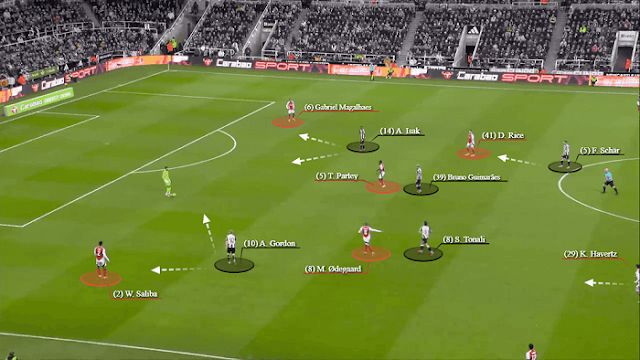By Tunji
Faleye
The recent Arsenal’s
overwhelming whitewash of Manchester City in their Premier League encounter was
applauded by Arsenal fans and football pundits the world over. The match was a display
of football artistry and a high-level performance by the Gunners. However, their
2-0 loss to Newcastle in their Carabao Cup match has shown that triumph at
times can lead to complacency, overconfidence, and a total decline in
performance. This phenomenon is particularly evident in marketing teams and
other brand builders where an array of successes can lead to complacency, and
quickly metamorphosed into strategic failures and underperformances.
When marketing
teams revel in their expertise and successes, this often creates an illusion
that future success is ascertained, reducing their thirst for planning, execution,
and assessment of imminent risk.
 |
Set up of Newcastle that resulted in Arsenal defeat in Carabao Cup
Overconfidence
After their
win against Manchester City, Arsenal may have assumed that their attacking formula
was infallible. This mindset possibly led to a lack of adaptation against Newcastle,
who exploited Arsenal’s defensive weaknesses and countered their style
effectively.
Marketing
teams often fall into a similar trap. After a successful campaign, they may
assume that the same strategy will work again, leading to a lack of innovation.
They might overlook market changes, consumer behaviour shifts, or competitor
responses, ultimately resulting in underwhelming performance.
 |
| Its a goaaaaaaaaaaaaaaaaal |
Reduced focus and fatigue
Another
factor that contributed to Arsenal’s defeat was the physical and mental fatigue
from their previous high-stakes match. Beating Manchester City required maximum
effort, leaving them drained for the next challenge.
Marketing
teams experience a similar effect after a big success. The intense effort
required to achieve a major win can lead to burnout. Team members may struggle
to maintain the same level of creativity, enthusiasm, and energy in subsequent
campaigns. Without a well-structured recovery and re-strategizing plan, this
can negatively impact performance.
Underestimating competitor's response
Newcastle entered
the game against Arsenal with a strategic plan, having observed Arsenal’s
tactics against Manchester City. They capitalized on Arsenal’s vulnerabilities,
proving that underestimating an opponent can be costly.
In marketing,
competitors are always watching. After a brand achieves a major success, rival
companies often analyze what worked and strategize countermeasures. If the
marketing team fails to anticipate and counteract these responses, their next
campaign may falter, allowing competitors to regain market share.
Conclusion
When success
is considered to be a strong motivation in anything we do, it is also a distraction
to achieve more. Marketers and brand builders need to constantly appraise strategies
and perfect execution of any campaign. Success should be a motivation to do
more by putting on thinking cap, and think within and outside the box to stay
on top of the game and achieve more for brands.
Maintaining a
culture of adaptability, improvement, and strategic foresight should be the
watchword of marketing professionals and brand builders for a sustaining
long-term success.
Kindly like, share and leave your comments.







0 Comments